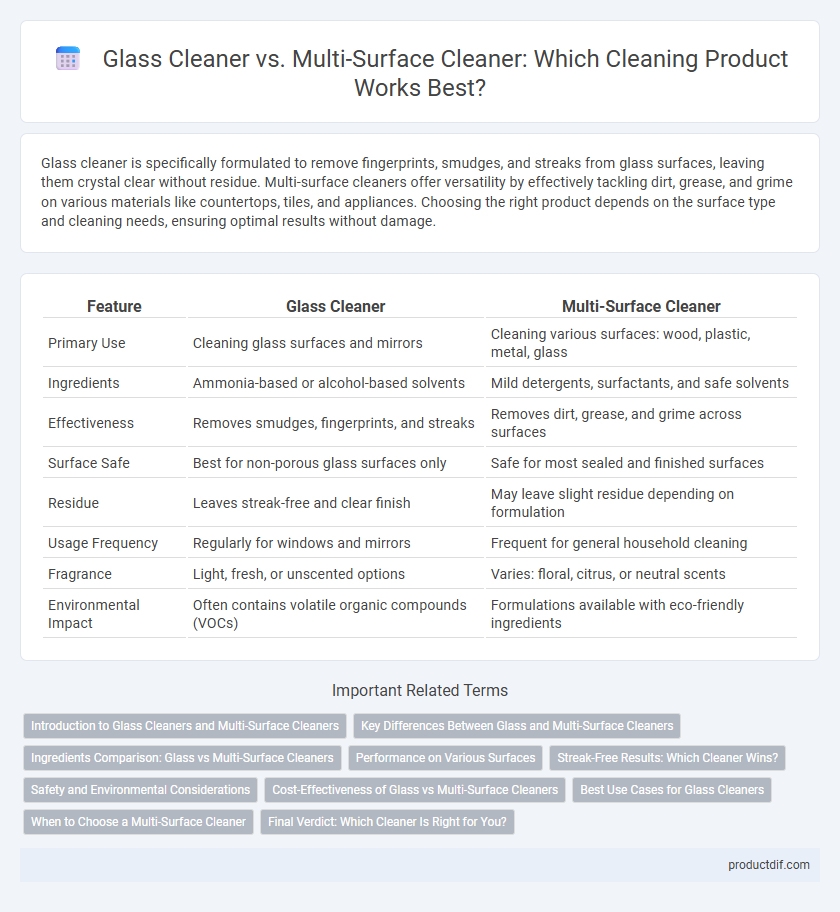Glass cleaner is specifically formulated to remove fingerprints, smudges, and streaks from glass surfaces, leaving them crystal clear without residue. Multi-surface cleaners offer versatility by effectively tackling dirt, grease, and grime on various materials like countertops, tiles, and appliances. Choosing the right product depends on the surface type and cleaning needs, ensuring optimal results without damage.
Table of Comparison
| Feature | Glass Cleaner | Multi-Surface Cleaner |
|---|---|---|
| Primary Use | Cleaning glass surfaces and mirrors | Cleaning various surfaces: wood, plastic, metal, glass |
| Ingredients | Ammonia-based or alcohol-based solvents | Mild detergents, surfactants, and safe solvents |
| Effectiveness | Removes smudges, fingerprints, and streaks | Removes dirt, grease, and grime across surfaces |
| Surface Safe | Best for non-porous glass surfaces only | Safe for most sealed and finished surfaces |
| Residue | Leaves streak-free and clear finish | May leave slight residue depending on formulation |
| Usage Frequency | Regularly for windows and mirrors | Frequent for general household cleaning |
| Fragrance | Light, fresh, or unscented options | Varies: floral, citrus, or neutral scents |
| Environmental Impact | Often contains volatile organic compounds (VOCs) | Formulations available with eco-friendly ingredients |
Introduction to Glass Cleaners and Multi-Surface Cleaners
Glass cleaners are specifically formulated with ammonia or alcohol-based solvents to remove smudges, fingerprints, and streaks from glass surfaces, ensuring a clear and streak-free finish. Multi-surface cleaners contain a balanced blend of detergents and mild solvents designed to safely clean a variety of materials such as wood, plastic, metal, and glass without damaging finishes. Choosing the right cleaner depends on the surface type and desired cleaning efficacy to maintain the appearance and integrity of household or commercial spaces.
Key Differences Between Glass and Multi-Surface Cleaners
Glass cleaners are formulated with specific ingredients like ammonia or alcohol to effectively remove streaks, smudges, and fingerprints from glass surfaces without leaving residue. Multi-surface cleaners contain broader cleaning agents designed to handle various materials such as wood, plastic, and metal, providing overall grime and stain removal but may leave streaks on glass. Choosing between these depends on the surface type: glass cleaners optimize clarity and shine on transparent surfaces, while multi-surface cleaners offer versatility across different household items.
Ingredients Comparison: Glass vs Multi-Surface Cleaners
Glass cleaners primarily contain ammonia or alcohol-based solvents such as isopropanol that effectively dissolve grease and leave a streak-free shine on transparent surfaces. Multi-surface cleaners typically include surfactants, mild detergents, and sometimes antibacterial agents designed to tackle dirt, grime, and bacteria on a variety of materials including wood, plastic, and metal. The distinct ingredient compositions reflect their targeted use, with glass cleaners optimizing for clarity and quick evaporation, while multi-surface formulas emphasize versatility and thorough cleaning power across multiple substrate types.
Performance on Various Surfaces
Glass cleaners are specifically formulated with ingredients like ammonia and alcohol to provide streak-free shine and effective removal of fingerprints and smudges on glass and mirrors. Multi-surface cleaners contain versatile surfactants and mild solvents designed to safely clean a variety of materials such as wood, plastic, metal, and laminate without causing damage. Performance-wise, glass cleaners excel on transparent surfaces by enhancing clarity, while multi-surface cleaners offer balanced effectiveness and protection across numerous household surfaces.
Streak-Free Results: Which Cleaner Wins?
Glass cleaners are specifically formulated with alcohol or ammonia to evaporate quickly, ensuring streak-free, crystal-clear surfaces on windows and mirrors. Multi-surface cleaners, designed for a variety of materials, often contain milder agents that may leave residue or streaks on glass. For optimal streak-free results, specialized glass cleaners outperform multi-surface alternatives in removing smudges and fingerprints without leaving film.
Safety and Environmental Considerations
Glass cleaners typically contain ammonia or alcohol-based ingredients, which can cause respiratory irritation and require proper ventilation during use, making safety precautions essential. Multi-surface cleaners often use milder surfactants and biodegradable components, reducing environmental impact and enhancing user safety without compromising effectiveness. Choosing eco-friendly, non-toxic formulations helps minimize pollution and ensures safer handling for both household members and professionals.
Cost-Effectiveness of Glass vs Multi-Surface Cleaners
Glass cleaners often provide a more cost-effective solution for cleaning windows and mirrors due to their targeted formulas that require smaller quantities per use, reducing overall expenditure. Multi-surface cleaners, while versatile and convenient for various household areas, tend to be pricier as they contain a broader range of ingredients designed to tackle multiple types of grime and surfaces. Choosing between glass cleaner and multi-surface cleaner depends on the cleaning needs, but for budget-conscious consumers focusing on window care, glass-specific cleaners offer greater value for money.
Best Use Cases for Glass Cleaners
Glass cleaners are specially formulated to remove smudges, fingerprints, and streaks from glass surfaces, making them ideal for windows, mirrors, and glass tabletops. Their fast-drying, ammonia-based or alcohol-based formulas ensure a clear, residue-free finish that enhances visibility and shine. Using glass cleaner on delicate glass surfaces provides superior clarity and prevents damage that harsher multi-surface cleaners might cause.
When to Choose a Multi-Surface Cleaner
Choose a multi-surface cleaner when you need a versatile solution for various materials such as wood, plastic, metal, and glass, offering convenience with one product for multiple surfaces. Multi-surface cleaners typically contain balanced ingredients that effectively remove dirt, grime, and fingerprints without damaging finishes or coatings. Opt for multi-surface cleaners in high-traffic areas or for routine cleaning where different surface types are present, ensuring efficiency and safe, streak-free results.
Final Verdict: Which Cleaner Is Right for You?
Glass cleaner excels at removing streaks and fingerprints from windows, mirrors, and glass surfaces with a formula designed for a crystal-clear finish. Multi-surface cleaners offer versatility, effectively cleaning countertops, appliances, and various materials but may leave residue on glass. Choose glass cleaner for sparkling, streak-free glass, and multi-surface cleaner for everyday cleaning of mixed surfaces to maintain overall cleanliness.
Glass cleaner vs Multi-surface cleaner Infographic

 productdif.com
productdif.com